- Home
- Iain Banks
Whit Page 2
Whit Read online
Page 2
'Isis-' Elias began.
'Beloved,' Herb snorted, glancing at me and rolling his eyes.
I smiled and gestured to Elias to continue.
'Beloved Isis,' Elias grinned, 'would you kindly cast some light into the poor occluded mind of our brother here on the matter of the co-essential nature of the body and the soul?'
'I'll try,' I said, suppressing a sigh.
Elias and Herb seem to thrive on interminable debates concerning the finest points of Luskentyrian theology; points so fine, indeed, that they were almost pointless (at the same time, I have to admit to a certain feeling of gratification at having two such glowing examples of Californian manhood - both a couple of years older than I - on their knees before me and hanging on my every word). 'What,' I asked, 'is the exact nature of your dispute?'
Elias shook his yellow duster at the other. 'Brother Herb here contends that if the Heresy of Size is to be fully rejected, then the soul, or at least that part which receives the Voice of the Creator, must effectively be the skeleton of the believer. Now, it seems obvious to me that…'
And on they went. The Heresy of Size came about when a few of Grandfather's original followers, misunderstanding his teachings on the physicality of the soul, decided that the bigger and fatter one was, the larger a receiver one presented for God's signals and so the better one would hear God's Voice. Perhaps the fact that Salvador had filled out somewhat over the previous few years to become an impressive and substantial figure had something to do with the Sizist Heresy; the disciples concerned had only known our Founder as a big, bulky man, and did not know that his rotundity was entirely a result of both blissful inner peace and his wives' extravagantly generous cooking; had they been able to see photographs of Salvador when he first appeared on the sisters' doorstep, when he was, apparently, quite skinny, they might not have deceived themselves so.
While Elias and Herb argued on, I nodded with all the appearance of patience and looked fleetingly round the wood-panelled hall.
Hanging in the hall and on up the gleaming walls of the broad stairwell there are various paintings and one framed poster. There is a portrait of the elder Mrs Woodbean, our benefactress, several landscapes of the Outer Hebrides, and - almost shockingly, given the way Grandfather feels about the contemporary media - a bright purple and red poster advertising an event in something called The Royal Festival Hall in London two years ago. The poster publicises a concert on the instrument called the baryton to be given by the internationally renowned soloist Morag Whit, and it is a measure of Grandfather Salvador's love of and pride in my cousin Morag that he suffers such a garishly modern thing to be displayed so prominently in his sanctum. Cousin Morag - the jewel in the crown of our artistic missionary work - was to be our Guest of Honour at the Festival of Love at the end of the month.
We are not a wealthy Order (indeed part of our attraction for outsiders has always been that we ask nothing from our followers save belief, observance and - if they come to stay with us - honest toil; all donations are politely returned) but we are more than self sufficient and the farm produces a decent surplus each year, part of which it pleases our Founder to spend supporting missionary work. Brother James in America and Sister Neith in Africa have saved many a soul over the last few years and we hope that Brother Topee - currently at Glasgow University - will become our envoy to Europe after he graduates and receives suitable instruction from Salvador. Cousin Morag is not a missionary as such, but it is our hope that her fame as an internationally famous baryton soloist, when combined with her espousal of our faith, will help turn people to the Truth.
Additionally, it has been Morag's expressed desire since the last Festival of Love to take a fuller part in this one, and we were happy to hear a couple of years ago that she had met a nice young man in London and wanted to marry him at this year's Festival.
When Elias and Herb had both explained their positions I looked thoughtful and answered them as best I could; as usual it was a dispute about nothing very much resulting from them making two subtly different but equally profoundly mistaken interpretations of Grandfather's teachings. I assured them that the answer would be found in their copies of the Orthography, if they only studied them properly. I left them still looking puzzled and ascended quickly to the first floor before they could think of any supplemental questions (that they would in any event I had no doubt, and could only hope that they would have moved on to another part of the floor or a different - and preferably quite distant - task entirely when I descended again).
The rattle of the Community's ancient Remington typewriter sounded from one of the old bedrooms, now the office, to the left at the top of the stairs. I could hear my brother Allan's voice as I reached the landing, where the floorboards creak. Allan's voice cut off, then I heard him say something else, and while I was walking towards the double doors which led to my Grandfather's quarters, the office door opened and the broad, flushed-looking face of Sister Bernadette poked out, framed in crinkly red hair.
'Sis - ah, Beloved Isis, Brother Allan would like a word.'
'Well, I'm a little late already,' I said, clutching the handle of Grandfather's anteroom and knocking on the door with the hand in which I was holding my travelling hat.
'It won't take-'
The door swung open before me and Sister Erin - tall, greying, primly elegant and looking somehow as though she'd been up for hours - stood back to let me in, sparing a small smile for Sister Bernadette's crestfallen face on the other side of the landing as she closed the door behind me.
'Good morning, Beloved Isis,' she said gesturing me towards the door to Grandfather's bedroom. 'You're well, I hope?'
'Good morning, Sister Erin. Yes, I am well,' I said, walking across the polished floor between the couches, chairs and tables while Sister Erin followed. Outside, beyond the partition at the courtyard windows which screens off Grandfather's private kitchen, I heard the school bell sound as Brother Calum called the children to their studies. 'And you?'
'Oh, well enough,' Erin said with a sigh it was hard not to suspect was fully supposed to sound long-suffering. 'Your Grandfather had a good night and a light breakfast.' (Sister Erin will insist on talking about Grandfather as though he is a cross between royalty and a condemned prisoner; admittedly he does encourage us all to treat him somewhat regally, and at the age of seventy-five may not have all that long left with us; but still.)
'Oh, good,' I said, as ever at a loss to respond suitably to such portentousness.
'I think he's had his bath,' Erin said, reaching round me to open the door to Grandfather's suite. She smiled thinly. 'Marjorie and Erica,' she said crisply as I took off my shoes and handed them to her. She hauled the door back.
The door opened to steps which led up onto the surface of Grandfather's bed, which is composed of six king-size beds and two single beds squeezed hard up against each other and which entirely fills the bedroom itself save for a single raised table near the far wall. The bed surface is covered with multitudinous quilts and duvets and several dozen pillows and cushions of varying shapes and sizes. The curtains had not been drawn, and in the gloom the bed looked like a relief map of a particularly mountainous area. The air was thick with the smell of incense candles, scattered everywhere along the single shelf which ran round the walls; a few were still lit. Gurgling noises and voices came from a half-open door ahead of me.
My Grandfather's large round wooden bath lies in the spacious bathroom beyond his dressing room, which is in turn beyond the bedroom. The bath-tub and its surrounding platform, constructed for him by Brother Indra, fills half the room; the rest contains an ordinary bath, a shower cabinet, washhand basin, toilet and bidet, all supplied from a tank in the mansion house loft which is itself fed from our river water-wheel (based on an ancient Syrian design, Indra says) via various filters - including a raised slope of reed-bed - a tangle of pipes, a methane-powered pump, roof-mounted solar panels, and, finally, a methane-boosted hot-water tank immediately above the ba
throom.
'Beloved Isis!' chorused Sister Marjorie and Sister Erica. Marjorie, who is three years my elder, and Erica, who is a year younger than me, wore peach-coloured shifts and were drying the bath with towels. 'Good morning, Sisters,' I said, nodding.
I pushed through the double doors into the lush and fragrant space which Grandfather calls the Cogitarium, a greenhouse which extends from the end of the mansion house's first floor and rests on the roof of the ballroom below, where we hold our meetings and services. The Cogitarium was even warmer and more humid than the bathroom.
My Grandfather, His Holiness The Blessed Salvador-Uranos Odin Dyaus Brahma Moses-Mohammed Mirza Whit of Luskentyre, Beloved Founder of the Luskentyrian Sect of the Select of God, I, and the Creator's OverSeer on Earth (and patently unembarrassed when it came to bestowing extra and religiously significant names upon himself), sat in a modest cane chair situated within a splash of sunlight at the far end of the greenhouse, up a chessboard-tiled path between the in-crowding fronds of multitudinous ferns, philodendrons and bromeliads. Grandfather was dressed, as usual in a plain white robe. The long, whitely curled mane of his hair had been dried, and with his dense white beard formed a nimbus round his head which seemed to glow in the misty morning sunlight. His eyes were closed. The leaves of the plants brushed at my arms as I walked up the path, making a gentle rustling noise. Grandfather's eyes opened. He blinked, then smiled at me.
'And how is my favourite grand-daughter?' he asked.
'I am well, Grandfather,' I said. 'And you?'
'Old, Isis,' he said, smiling. 'But well enough.' His voice was deep and sonorous. He is a handsome man, still, for all his years, with a powerful, Leonine face and skin that might grace a man half his age. The only blemish on his face is the deep, V-shaped scar high on his forehead which is the original emblematic mark of our Order. That deep, rich voice, which rings out above us all when we sing during a service, is identifiably Scots, though tinged with a hint of public-school English and the occasional American vowel sound.
'Blessings to you, Grandfather,' I said, and made our Sign, bringing my right hand up to my forehead and administering what might best be described as a slow tap. Salvador nodded slowly and indicated a small wooden seat by the side of his cane chair.
'And blessings to you, Isis. Thank you for coming to see your old Grandfather.' He put his right hand slowly up to the back of his head, and winced. 'It's this neck again.'
'Ah ha,' I said. I put my hat down on the seat he'd waved at and went to stand behind him, putting my hands on his shoulders and starting to massage him. He let his head drop a little as I kneaded his muscles, my hands working across his smooth, lightly tanned skin.
I stood there in the hazy sunlight, its glowing warmth twice-filtered by mist and glass, and ran my hands over my Grandfather's shoulders and neck, no longer massaging but simply touching. I felt the strange, welling itch inside myself that is the symptom of my power, felt its tickle come rising through my bones and go tingling into and through my hands, and knew that I still had my Gift, that I was Healing.
I confess that a few times in such situations I have attempted to discover if touch is really necessary for my Gift to work; I have let my hands hover just over some afflicted animal or bodily part, to see if mere proximity is sufficient to create the effect. The results have been - as my old physics teacher would have said - indubitably ambiguous. With animals, I simply am not sure, and with people, well, they can tell you aren't touching them, and touching is what they seem to expect for the Gift to work. I have always been coy about taking anybody into my confidence concerning the exact reason for my interest in this matter.
'Ah, that's better,' Grandfather said, after a while.
I took a deep breath, letting my hands rest on his shoulders. 'All right?'
'Very much so,' he said, patting my right hand. 'Thank you, child. Come now; sit down.'
I lifted my hat and sat on the wooden seat at his side.
'Off to play the organ, are we?' he asked.
'Yes, Grandfather,' I said.
He looked thoughtful. 'Good,' he said, nodding slowly. 'You should do things you enjoy, Isis,' he told me, and reached out to pat my hand. 'You are being given the luxury of time to prepare for your role in the Order, once I'm gone-'
'Oh, Grandfather-' I protested, no more comfortable than usual with this line.
'Now, now,' he said reasonably, patting my hand again. 'It has to happen eventually, Isis, and I'm ready and I shall go happily when the time comes… but my point is that you should use that time, and use it not just to study and sit in the library and read…'
I sighed, smiling tolerantly. I had heard this line of argument before.
'… but to live your life as young people need to, to seize the opportunity to live, Isis. There will be time enough to take on cares and responsibilities in the future, believe me, and I just don't want you to wake up one morning after I'm gone with all the weight of the Community and the Order on your shoulders and realise that you never had any time for enjoyment and freedom from cares while you were young and now it's too late, do you see?'
'I see, Grandfather.'
'Ah,' he said, 'but do you understand?' His eyes narrowed. 'We all have selfish, even animal urges, Isis. They have to be controlled, but they have to be given their due, as well. We ignore them at our peril. You may make a better and more selfless leader of the Order in the future if you behave a little more selfishly now.'
'I know, Grandfather,' I told him, and put on my most winning smile. 'But selfishness takes different forms, too. I indulge myself most shamelessly when I'm sitting reading in the library, and going to play the Flentrop.'
He took a deep breath, smiling and shaking his head. 'Well, just never forget that you're allowed to enjoy yourself.' He patted my hand. 'Never forget that. We believe in happiness, here; we believe in joy and love. You are entitled to your share of those.' He let go of my hand and made a show of looking me up and down. 'You're looking well, young lady,' he told me. 'You're looking healthy.' His grey, abundant eyebrows flexed. 'Looking forward to the Festival, are we?' he asked, his eyes twinkling.
I brought up my chin, self-conscious beneath the Blessed Salvador's gaze.
I suppose I must describe myself at some point and now seems as good a time as any to get it over with. I am a little above average height and neither skinny nor fat. I keep my hair very short; it grows in straight if allowed to. It is surprisingly blonde for my complexion, which has a hue roughly in keeping with my 3:1 racial mix (though in my vainer moments I confess I like to think I inherited a little more than my fair share of my grandmother Aasni's high-boned Himalayan handsomeness); my eyes are large and blue, my nose is too small and my lips are too full. They are also inclined to leave a slight gap through which my unremarkable teeth may be seen unless I deliberately keep my mouth firmly closed. I believe I developed late, physically, a process that has at last ceased. To my great relief my chest has remained relatively non-pneumatic, though my waist has stayed narrow while my hips have broadened; at any rate, I have at last gone one full year without once being referred to - at least in my earshot - as 'boyish' in aspect, which is a blessing in itself.
I was dressed in a white shirt - reverse-buttoned, of course - narrow black trousers and a long black travelling jacket which matches my broad-brimmed hat. My brother Allan calls this my preacher look.
'I'm sure we're all looking forward to the Festival, Grandfather,' I told him.
'Good, glad to hear it,' he said. 'So, you're off to Dunblane, are you?'
'Yes, Grandfather.'
'You'll come round this afternoon?' he asked. 'I've been having more thoughts about the re-draft.'
'Of course,' I said. I had been helping Grandfather with what we all suspected would be the final version of our Good Book, The Luskentyrian Orthography, which has been undergoing a kind of divinely sanctioned rolling revision ever since Grandfather began the work, in 1948.
'Fine,' he s
aid. 'Well, have a good… whatever it is you have playing an organ,' he said, and smiled. 'Go with God, Isis. Don't talk to too many strangers.'
Thank you, Grandfather. I'll do my best.'
'I'm serious,' he said, frowning suddenly. 'I've had this… feeling about reporters recently.' He smiled uncertainly.
'Was it a vision, Grandfather?' I asked, trying to keep the eagerness out of my voice.
Visions have been important to our Faith from the beginning. It all started with one which my Grandfather had all those forty-seven years ago, and it was the series of visions he had thereafter that guided our Church through its early vicissitudes. We believed in, trusted and celebrated our Founder's visions, though they had - perhaps just with age, as he had been the first to suggest - become much less frequent and dramatic over the years.
He looked annoyed for a moment, then wistful. 'I wouldn't put it as strongly as a revelation or a vision or anything,' he said. 'Just a feeling, you know?'
'I understand,' I said, trying to sound soothing. 'I'll be careful, I promise.'
He smiled. 'Good girl.'
I took my hat and left the Cogitarium. The Sisters had left the bathroom looking dry and smelling clean. I ascended into the up-thrust landscape of the bedroom and crossed to the far side through the gloom. I picked my boots up from the floor of the sitting room.
'How is he this morning?' Erin asked from her desk near the double doors as I did up my laces. Sister Erin looked at my boots with an expression consistent with having seen something unpleasant on the soles.
'In a jolly good mood, I'd say,' I told her, to be favoured with a wintry smile.
* * *
'Hey, Is,' Allan said as we exited doors on either side of the landing at the same time.
My elder brother is tall and fit, and fair both in hair and skin; we share eye-colour, though his are apparently more piercing. He has a broad face and an easy, confident grin. His gaze is prone to darting about, shifting all the time as he talks to you with that winning smile, coming back to your eyes every now and again to make sure you're still listening and only zeroing in on you when he wants to convince you of his sincerity. Allan claims he clothes himself by way of the Stirling charity shops like the rest of us, though some of us have wondered quite how he seems to find perfectly fitting three-piece suits and smart blazers with such remarkable regularity. If we occasionally ungraciously suspect him of Vanity, however, we are content that when he travels out-with the Community he favours frayed, tatty country clothes. That morning he wore a pair of faded jeans with a crease and a tweed jacket over a checked shirt.

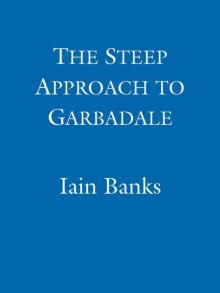 The Steep Approach to Garbadale
The Steep Approach to Garbadale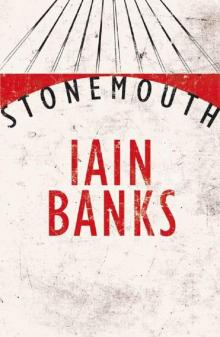 Stonemouth
Stonemouth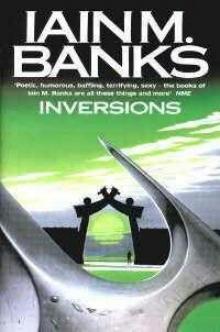 Inversions c-6
Inversions c-6 Raw Spirit: In Search of the Perfect Dram
Raw Spirit: In Search of the Perfect Dram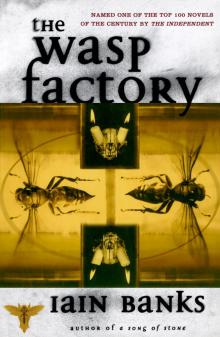 The Wasp Factory
The Wasp Factory Raw Spirit
Raw Spirit Walking on Glass
Walking on Glass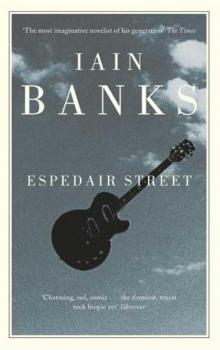 Espedair Street
Espedair Street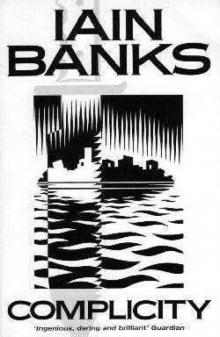 Complicity
Complicity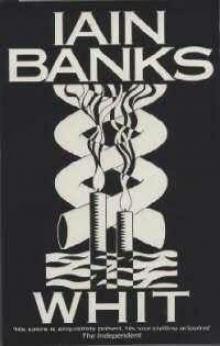 Whit
Whit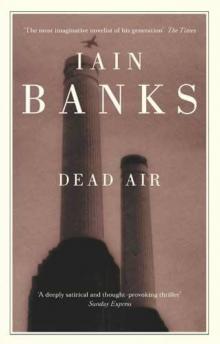 Dead Air
Dead Air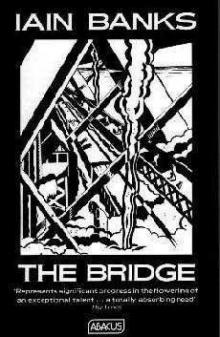 The Bridge
The Bridge The Business
The Business Canal Dreams
Canal Dreams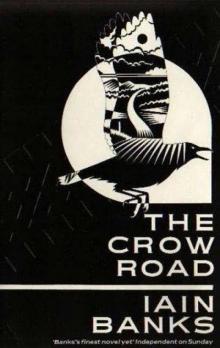 The Crow Road
The Crow Road